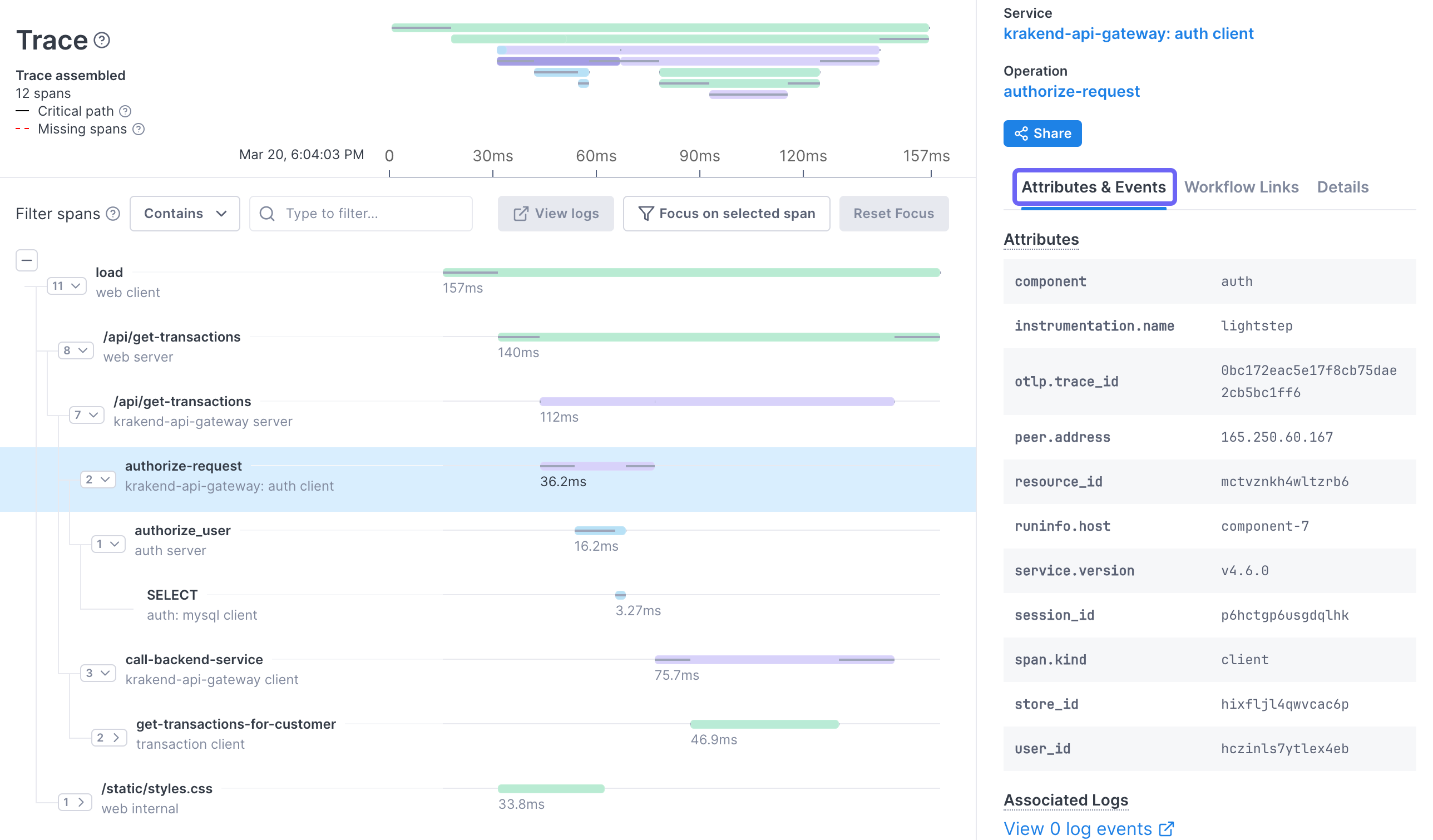When you create Workflow Links, you use variables in the Name and URL so that span-specific content displays. Variables use the Mustache syntax.
For example, in this link definition:
| Name | Playbook for {{$service}} - {{MY_ERROR_TYPE_ATTRIBUTE}} error |
| URL | http://wiki.com/playbook-{{$service}}-{{MY_ERROR_TYPE_ATTRIBUTE}} |
| Rules | {
"$service": null,
"$hasError": [true],
"MY_ERROR_TYPE_ATTRIBUTE": null
}
|
Both {{$service}} and {{MY_ERROR_TYPE_ATTRIBUTE}} are variables. The {{$service}} variable resolves to the span’s service and is a Cloud Observability variable (denoted by the $). The {{MY_ERROR_TYPE_ATTRIBUTE}} represents a user-defined variable. User-defined variables don’t use the $. Here, it represents an attribute on a span. Any attribute you have on your spans can be used as a variable.
User-defined variables
The attributes that you create in your tracing code can be used as variables in Workflow Links. For example, if you’ve created the error_type attribute in your code like this:
1
2
3
4
5
6
Span span = tracer.spanBuilder("/project/:project-id/list") // operation named after the route
.setSpanKind(Span.Kind.CLIENT) // tag the span as a service boundary
.startSpan();
span.setAttribute("error_type_", "world");
span.end()
Then you can use the {{error_type}} variable in your links. However, you need to be sure that the attribute exists for the span. The easiest way to do this is to view the sidebar on the Trace View page. Attributes are listed for the span there.

Cloud Observability variables
The following are the Cloud Observability-specific variables that you can use in your Workflow Link names, URLs, and rules. Many of these also appear in the sidebar of the Trace View page.
Be sure to use a $ in front of all Cloud Observability variables.
Span variables
These variables provide information about a span.
$hasError |
The span has the attribute error=true |
$operation |
The name of the span’s operation |
$parentSpanGUID |
The ID of this span’s parent |
$service |
The name of the span’s service |
$spanGUID |
The span’s ID |
$traceGUID |
The ID of the trace that this span belongs to |
Time-based variables
These variables provide time information about the span.
$durationMicros |
The duration of this span, in microseconds |
$endTimeISO |
The span's end time, expressed in UTC (ISO 8601 format), e.g. 2019-06-18T00:17:59.131Z |
$endTimeMicros |
The span's end time, rounded to microseconds |
$endTimeMillis |
The span's end time, rounded to milliseconds |
$endTimeMillis-5min |
Five minutes before the span's end time in milliseconds |
$endTimeMillis+5min |
Five minutes after the span's end time in milliseconds |
$endTimeMillis-1hr |
One hour before the span's end time in milliseconds |
$endTimeMillis+1hr |
One hour after the span's end time in milliseconds |
$startTimeISO |
The span's start time, expressed in UTC (ISO 8601 format), e.g. 2019-06-18T00:17:59.131Z |
$startTimeISO-5min |
Five minutes before the span start time, expressed in UTC (ISO 8601 format), e.g. 2019-06-18T00:17:59.131Z |
$startTimeISO+5mi |
The span's start time, plus five minutes, expressed in UTC (ISO 8601 format), e.g. 2019-06-18T00:17:59.131Z |
$startTimeISO-1hr |
One hour before the span start time, expressed in UTC (ISO 8601 format), e.g. 2019-06-18T00:17:59.131Z |
$startTimeISO+1hr |
The span's start time, plus one hour, expressed in UTC (ISO 8601 format), e.g. 2019-06-18T00:17:59.131Z |
$startTimeMicros |
The span's start time, rounded to microseconds |
$startTimeMillis |
The span's start time, rounded to milliseconds |
$startTimeMillis-5min |
Five minutes before the span's start time, rounded to milliseconds |
$startTimeMillis+5min |
The span's start time, plus five mintues, rounded to milliseconds |
$startTimeMillis-1hr |
One hour before the span's start time, rounded to milliseconds |
$startTimeMillis+1hr |
The span's start time, plus one hour, in milliseconds, (rounded down) |
$startTimeSeconds-5min |
Five minutes before the span start time, rounded to seconds |
$startTimeSeconds+5min |
The span's start time, plus five minutes, rounded to seconds |
$startTimeSeconds-1hr |
One hour before the span start time, rounded to seconds |
$startTimeSeconds+1hr |
The span's start time, plus one hour, rounded to seconds |
Miscellaneous variables
$platform |
The type of client library that reported this span, for example, java, go, python |
$platformVersion |
The version of the client library that reported this span, e.g. go1.12.5 |
$project |
Name of the Cloud Observability project that includes this span (as shown in the page URL) |
See also
Create and manage Workflow Links
Updated Dec 1, 2019
